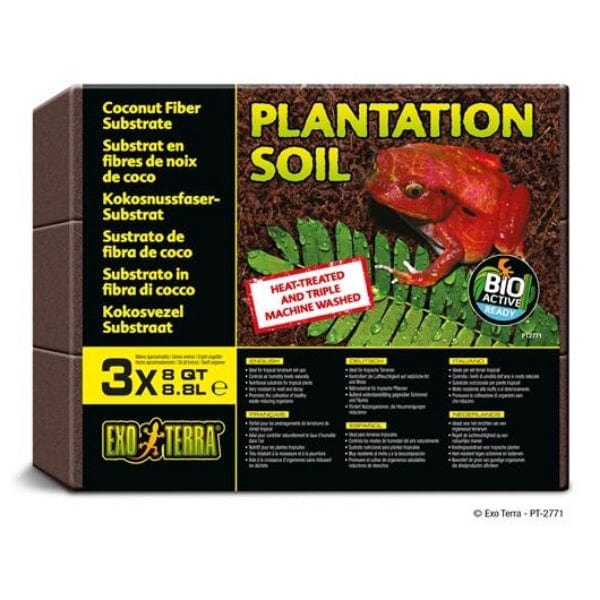The Exo Terra Plantation Soil is a 100% natural and biodegradable terrarium substrate crafted from sustainably sourced, ground coconut husk fiber grown on tropical Asian plantations. Its unique moisture - absorbing properties naturally regulate the terrarium's humidity, making it completely safe for frogs, salamanders, and other burrowing or digging critters. Adequate humidity levels assist in shedding and prevent respiratory infections. This soil is perfect for creating natural planted terrariums for humidity - loving reptiles, amphibians, and invertebrates. With excellent water retention, natural rooting hormones, and anti - fungal qualities, it promotes robust plant growth in your terrarium. The special coir pith in this soil is a blend of short fibers and coco - peat in various sizes, from coarse granules to fine clumps, improving soil drainage and root aeration. The enhanced aeration also encourages the growth of waste - reducing organisms, keeping your terrarium fresh and clean. It's triple machine - washed to remove salt, machine - dried, and heat - treated to reduce bacteria. Thanks to its moisture - holding ability, it can be used as an incubation medium. It's non - toxic, free of chemicals and pesticides, and can be safely composted in your garden. Ideal for tropical terrariums, it naturally controls air humidity, serves as nutritious soil for tropical plants, resists mold and decay, and supports the growth of beneficial organisms. Available in single brick (8qt / 8,8L) or 3 - pack (3 X 8qt) options.

Using Exo Terra Plantation Soil is easy. First, choose the right size for your terrarium - you can get a single brick or a 3 - pack. If you get the bricks, soak them in water until they expand and break apart. Then, spread the soil evenly at the bottom of your terrarium. When setting up a tropical terrarium, plant your humidity - loving plants in the soil and add your reptiles, amphibians, or invertebrates. To maintain the soil, regularly check the humidity levels. The soil will help regulate it naturally, but you may need to mist the terrarium occasionally if the air gets too dry. Also, keep an eye on the waste - reducing organisms. If the soil starts to look dirty or smelly, it might be time to replace part of it. Remember, this soil is non - toxic and can be composted in your garden, so you can dispose of it safely when needed.
